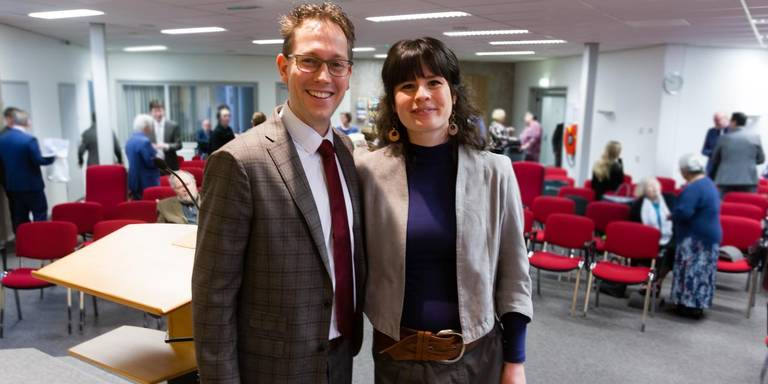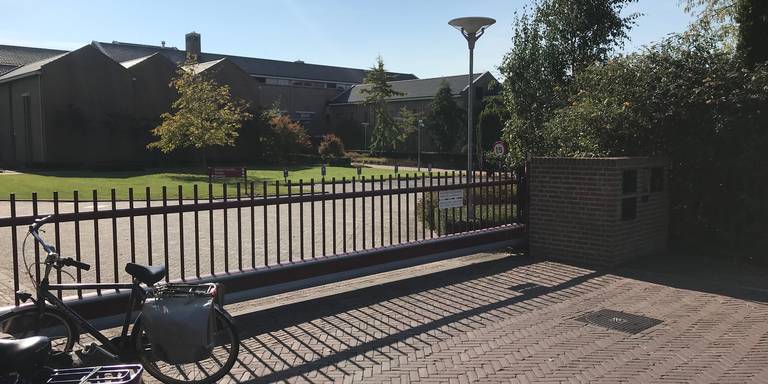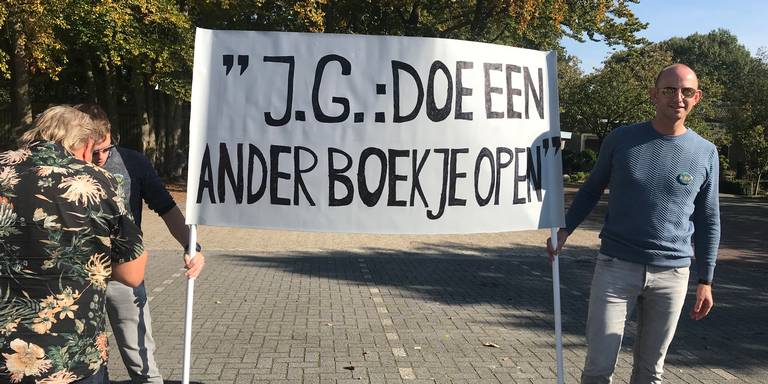The Jehovah’s Witnesses are under fire because of persistent allegations of child abuse. How does the closed community deal with this? A story from within.
Originally in Dutch by Daniëlle Molenaar en Rosa Timmer at Dagblad van het Noorden
Almost everyone in Emmen knows it: opposite Terra College is the national headquarters of Jehovah’s Witnesses. In the complex, 140 Jehovah’s Witnesses live and work. The plot is closed with a red, iron gate that almost always remains closed. Even when ex-members protested directly against the sexual abuse of Jehovah’s Witnesses from outside, the gate did not open a crack.
The question is becoming increasingly urgent: what is it like to live in a fundamentalist Christian community that is also seen as a cult group? Do these Jehovah’s Witnesses feel that they have addressed the accusations of former members who were abused as children within the community?
What happens behind that red gate?
After much insistence, we succeeded in gaining access to the closed world of the Watchtower Society. According to their headquarters, the Jehovah’s Witnesses have more than eight million members in 240 countries worldwide. In the Netherlands there are just under 30,000 members. About 3000 Jehovah’s live in Drenthe, Groningen and Friesland. There are 25 Kingdom Halls in the North.
Contact with the members is made by e-mail to the head office. There, the decisions are made about what can and cannot be done.
Kingdom Hall
Except for meeting a group of Jehovah’s witnesses going door to door, to experience their evangelism from the other side is not permitted. However, if you like, attending one of their services is. “The door is open to everyone,” says Elias Wittenberg (41), a Dutch Jehovah’s Witness from Hoogezand.
So, on a drizzly Sunday morning we are sittinging between a group of men in neat suits, women in skirts and neatly dressed children at the Kingdom Hall in Jufferenpad, Meppel. This is one of the 25 Kingdom Halls in the Northern Netherlands. There is no symbol of faith inside. Only a large white board with the same text you’ll find all over the world.
Don’t worry, for I am your God.
Everyone has known each other for a long time, usually from birth. An unknown face between the brothers and sisters, as the Jehovah’s witnesses refer to each other, is immediately noticeable. A lot of people come to shake our hand and have a chat.
Almost all of the hundred seats in the hall are now occupied. The couple Matthias (28) and Romee Broertjes (29) from Meppel have kept a spot free for us. Matthias is one of the elders in the congregation. The service starts with a song, followed by a biblical lecture. Many brothers and sisters read along via an app on a tablet or phone.

For those present in the room this is all a piece of cake. It is their firm conviction that the end of time is near. Jehovah’s Witnesses will live on after that Armageddon into paradise on earth. That is the ‘good news’ they tell when they call to people’s doors.
The meeting in the Kingdom Hall is not a suitable place to have an in-depth conversation with the Jehovah’s witnesses about their lives, let alone about the child abuse stories.
Brothers and sisters
When visiting the couple Broertjes, more than a week later, we find it much better to discuss such matters. They regularly call themselves ‘happy’ Jehovah’s Witnesses and they radiate that happiness too. Romee looks a lot less formally dressed at home than during the service. She wears sneakers with jeans and wears make-up. He doesn’t wear a jacket this time, but a neat sweater.
They have a lot of friends, but not outside their community, they explain. “True friends, these are the brothers and sisters.” Jehovah’s Witnesses form a close community.
Eight years ago, they consciously started looking for a marriage partner within the community. It’s easier to live with someone who has the same lifestyle, they say. Like not celebrating birthdays, not even of children.
They don’t celebrate birthdays because Jesus didn’t do that either, according to them. Jehovah’s Witnesses try to live as much as possible as Jesus himself. As an outsider you may have pity for their children who are at school with peers who get treats and have parties. Matthias didn’t experience it that much: “We were spoiled at other times: my four brothers and I had a subscription to Six Flags amusement park. Not celebrating Christmas while the rest of the class did was not a problem either. “We didn’t have to go to school and went to an indoor playground in Oranje. There were around fifty Jehovah’s Witness families. At our request the Christmas music was switched off on that day.
Matthias and Romee answer all questions with patience and a smile. Matthias starts talking about the fact that Romee and he had no sex before marriage. One of the many strict commandments in their faith. “That was quite difficult,” he admits, honestly.
They married in 2012, after fourteen months of courtship. “That’s quick but you see that more often with Jehovah’s Witnesses. Otherwise, it cannot be sustained.”

Abuse
Romee was 15 when she was baptized. Matthias was 18 years old. They started evangelizing from door to door much earlier. And still, with as much, if not even more, commitment.
They hear little during their evangelism about the abuse stories that have come out. Romee: “But I find each victim as one too many; it’s repulsive. It is terrible if that happens.” She has never noticed anything of abuse. “Because we are one big family, I never felt unsafe in my youth.” Matthias: “It is important to test the accusations against reality. The image of today is that abuse is tolerated within Jehovah’s Witnesses: that is not the case.”
Within the community much is done to prevent child abuse, according to his wife. “There is a lot of attention to it. It is clear that you have to talk to children about these things. It also says that parents should not be naive and should not create situations where it is easy to abuse a child.” She refers to the Society’s website. On the site is an animated series for children: Caleb and Sofia. The series discusses how to behave in the field service, why to forgive others and why the services are important. One episode has the name ‘Protect Your Children’, explaining in veiled terms that children should say ‘no’ and run away if ‘someone does something they don’t want’. What that ‘something’ is, is not clear.
The films were made in America, where the global leadership is centrally located. The Dutch translations were recorded in the recording studio at the head office in Emmen on the outskirts of the Bargeres residential area. That is our next stop. After long insistence, we were able to make an appointment with the national spokesman for the Jehovah’s Witnesses, Michel van Hilten. We press the bell and the burgundy iron gate opens for us.
With a camera we walk up to the main entrance.
Bethelite
The lobby of the office building is spotless. Van Hilten soon arrives with quick passes. He is wearing a colourful green jacket with an orange tie. He said before beginning that no pictures can be made in the building and he doesn’t want to be photographed himself.
Our guided tour follows the exact route of the guided tour signs. Pulling open a door in between or spontaneously starting a conversation with a neatly dressed passer-by is not permitted, we feel.
All these signs are made in Emmen, as we see when we meet Paul. Paul is a single man of 31. He has lived and worked in the complex for ten years. He was expecting us.
Paul is mostly alone in the Braille centre. There, for example, The Watchtower magazine is printed in Braille, in 25 languages.
“In between I make these signs”, he tells us while holding up a picture for the toilet. We nod, and then we notice the silence. There are no radios because they distract too much. Moreover, it is not a good idea to have to change channels all the time because of content that does not please Jehovah.
That the head office is in Drenthe is a coincidence, says Van Hilten. More than 35 years ago the society moved to Emmen. The complex of the Jehovah’s Witnesses is 5 hectares, of which more than a quarter is built-up. The houses are only 40 square meters for a couple or two single people. No children live there.
In the main building there are offices, a reception room, an auditorium, a recording studio and a shared kitchen and dining room.
What is special is that Paul has been volunteering at such a young age for ten years. He has board and lodging. But even then, he has been working and living with the Society since he was 21. Is he not busy with his future because he believes that the end of time is near? Or is it because he has nothing to fall back on?
We can’t ask him, because Van Hilten looks at his watch. It is ten to five. “Sorry guys, we have to move on.” We leave Paul in his quiet office.
Tight regime
After studying law, Van Hilten had an asset management company. “I sold my house and my business. At one point it felt very hypocritical for me to come to people’s doors to tell them about the coming of God’s Kingdom on earth and then simultaneously be busy with my business”.
In the library we find a 29-year-old single man, Timo, behind a computer. “I have been living here for five years,” he says. How do you meet someone when you live here as a single young man among the couples? we ask. Before Timo can answer, Van Hilten laughs it away: “I’m convinced that Timo will find a woman.”
The people in Bethel live under a strict regime. Each weekday starts at 7.30 a.m. with morning worship in the auditorium, then they volunteer from 8 a.m. to 5 p.m., interrupted by an hour for lunch break. The work varies from cleaning to highly skilled work as an interpreter/translator.
Jehovah’s Witnesses at offices in countries in the same time zone as the Netherlands can call the helpdesk staff in Emmen to solve computer problems. The construction department coordinates the maintenance and new construction of Kingdom Halls in the Netherlands. There are also employees who help members who must go to the hospital for a serious operation because Jehovah’s Witnesses do not want to take blood. “We have a list of doctors in hospitals who guarantee that they do operations without blood transfusion.”
The head office is not a monastery where nuns or monks stay for life. “But it is not a transit house either, people must be prepared to settle here for some time.” What is striking next to the silence is the emptiness. In the large building we meet very few people. Also, outside the houses with balconies overlooking the garden, there is no one to be seen.
Raid
It was different during the search raid on a November day in 2018. On that day, thirty detectives are standing in front of the gate. They want to go inside to secure evidence for the criminal investigation of child abuse by (former) members of the Jehovah’s Witnesses. “They had not announced their visit,” says Van Hilten. “So, we first called our lawyer.”
The investigation team had a search warrant. They must be allowed in.
“We didn’t think that was a problem. We do nothing mysterious.”
The investigation focused on data from nine suspects that was reported by former members. They claim to have been abused by an adult Jehovah’s Witness while children. They also claim that Jehovah’s Witnesses prefer to solve these matters inside their community rather than go to the police.
What is true about this? The society has its own judicial committee consisting of three elders for whom members must appear if they have violated our principles, explains Van Hilten. “If there are suspicions of abuse, the accused is heard by the committee, the victim as well, or his or her parents. Child abuse will of course not be tolerated at all. A fellow believer is reprimanded and expelled.”
Van Hilten says that it is not the task of elders to file a report to the authorities. “When a victim reports, he or she often wants to tell their story, but they do not want the whole bureaucratic process. If a victim wants to go to the police, he or she is free to do so, says Van Hilten. According to him, a handful of reports have been filed in the past number of decades.
The elders are not officials with a duty to report like doctors, he explains. “What they hear is told in confidence. Elders have a duty of silence.”
Elders are certainly not experts in the field of child abuse either. Van Hilten acknowledges this. When asked whether such a judicial committee would even increase the trauma for the victim, he remains silent for a moment. “The victim may take the parents with him or be represented by the parents. The parents and the victim are free to seek other help themselves. There are also many trusted people within our community whom they can turn to.”

No files
During the raid on the Emmen office, the policemen are looking for child abuse files from the judicial committee. Van Hilten cannot suppress a cynical gaze. He finds it hard to suppress his hate for the agents in charge of it. “There are no files here, we don’t have what they are looking for.”
Yes, reports are made of the hearings, but for privacy reasons, everything is destroyed once the case is completed. “The only thing that remains is a note that a fellow believer is expelled and in one sentence why. That is so that someone can’t just take up a position within the Jehovah’s Witnesses. That is for the protection of ourselves as a community.” He believes these notes are useless to the detectives.
The detectives were in hours that day. They searched through cupboards and drawers, safes are opened. They leave with one thin folder containing some papers.
The ongoing criminal investigation focuses on individual suspects and not on the Society. Yet a raid by dozens of police officers can be intimidating. Van Hilten was left with the following comment: “We thought the raid was unnecessary, because there was nothing to be found. We had told them that before.”
The atmosphere becomes very different when it comes to the Reclaimed Voices foundation, in which alleged victims of sexual abuse unite and bring out their stories through the media. Hilten, who has been very friendly to us for two hours, now turns red.
Red with anger.
“They make use of the #metoo movement when abuse stories are in vogue. The foundation abuses the victims who want to tell their story so that they can create a witch-hunt against Jehovah’s Witnesses.”
Frank Huiting, founder of the foundation, has emphasized since the beginning that his foundation is not meant to blacken the Jehovah’s Witnesses, but to protect the children in the organization.
The frustration in Van Hilten’s face builds up even more when we confront him with these statements. “The more they say that they are not against Jehovah’s Witnesses, the angrier I become. Yes, yes. The victims are welcome to speak with us, but not that foundation ever again. What they do is so disproportionate. These are people who have a certain resentment against us because they are expelled.”
The foundation received three hundred reports of abuse within the organisation. Van Hilten doubts this number. “I always see the same victims in the media. Anyway, these are almost all matters from a very long time ago.” He believes it is heavily exaggerated.
“We have calluses on our souls and it is our priority to help those who have experienced abuses.”
He does not give in at all. Yet things have been set in motion within the community by the stories of abuse. “The protocols on how we deal with this have been clarified and put on the website. We have always had policies, but it is good to make them more transparent. In that respect, the foundation can dissolve its activities. The goal has been achieved.”
Van Hilten is convinced that children within the community are better protected than outside, because there are so many instances of mutual control. “There are few occasions when the child is unattended by their parents.”
It is this control that makes it doubly difficult for the victims who often have been struggling for years with a great secret: that they were abused as children within the community. The community of Jehovah’s Witnesses is a close, warm one, but the devotion and the strict rules that go with it also encourage something else. Isolation.
It has been five o’clock and Van Hilten says that the weekend will start. A weekend of meeting, field service and Bible study. We would have liked to have talked to Paul longer. With Timo. With other residents.
With a vague feeling we walk back to the car along the tightly raked grass fields. We get the feeling that we have mainly seen what we were permitted to see. That it was directed.
When we are three steps away from the terrain, the red gate closes behind us.